How To Use Catalytic Converter Cleaner
The Drive and its partners may earn a commission if you purchase a product through one of our links. Read more.
Volatile gasoline, water, dust, and heat can cause your vehicle to experience fuel system buildups. Dirt, crystals, and carbon particles combine to narrow your fuel lines, obstruct your fuel pump and pressure regulator, and cause havoc in your fuel injectors. When those fuel system issues rear their heads, you need a fuel system cleaner to get your fuel system cleaned out and working at 100 percent.
With dozens of cleaners on the market, how do you pick the right one? Well, we're here to help.

Why Trust Us
Our reviews are driven by a combination of hands-on testing, expert input, "wisdom of the crowd" assessments from actual buyers, and our own expertise. We always aim to offer genuine, accurate guides to help you find the best picks.
Learn more
Benefits of Catalytic Converter Cleaner
- Improve engine performance. If your engine is no longer running smoothly, this could be the result of carbon build-up in your fuel system. Using a fuel system cleaner to remove these carbon build-ups and unclog your injectors can add power and improve fuel efficiency.
- Improve fuel economy. Clogged injectors leave your vehicle feeling sluggish, and that means you spend more time with your foot on the gas just to maintain your speed. This means more fuel burned and more time filling up. Injectors that stick open, or that have one or more tiny nozzles clogged can dump too much fuel into your engine, sending your pricey unburned gasoline right out your tailpipe.
- Prevent costly repairs. Failing to keep your fuel system clean can lead to expensive problems down the road. A poorly-running engine that isn't getting the right amount of fuel can damage expensive O2 sensors and catalytic converters. Clogged injectors can also lead to overworking your fuel pump, another costly replacement.
- Help meet emission requirements. Clogged fuel injectors and a gummed-up fuel system have a big effect on your vehicle's emissions. If you're living somewhere with emissions testing, fuel injector cleaner could be the difference between a pass and a fail on those tests.
Top Brands
Red Line Oil
Red Line Oil started making lubricants for race cars in 1979. That includes motor, gear, and transmission oils. Since then it has expanded to make more than 100 products including cooling system, oil, and fuel system additives and performance enhancers.
Chevron
Chevron is one of the companies created with the breakup of Standard Oil, so they've been in the petroleum business for almost as long as it has existed. Chevron is a major multinational energy company and one of the leading names in not just fuels like gasoline, but also in fuel additives like fuel system cleaners.
Royal Purple
Texas-based Royal Purple is known as much for its signature color as it is for its high-performance lubricants automotive additives. Though the company became a performance industry staple for its synthetic motor oils and other lubricants, today Royal Purple makes a full line of automotive and industrial lubricants as well as performance fuel system additives.
Fuel System Cleaner Pricing
- Under $10: For less than $10, you'll find plenty of fuel system cleaners from some of the top automotive chemical companies. At this price point, products are normally intended for regular use over occasional use. Think adding a bottle with every tank of gas maintenance cleaning, not for a once a year or "we have a problem" cleaning.
- $10 to $30: At this price point you're going to find plenty of top-shelf fuel system cleaners that are designed to deep clean your entire fuel system. These cleaners are the ones that are ideal for once a year use, to add to your fuel at each oil change, or to use when you first notice that your vehicle seems to be having a fuel system issue.
- $30 and up: If you're spending this much, you're probably buying a bulk pack of fuel system cleaner. Either one large container you need to meter out, or multiple single-use bottles. At this price point, if the product is one single-use, then you might be paying too much for your fuel system cleaner.
Key Features
Type of Cleaner
There are two basic types of fuel system cleaner. One for gasoline engines, which includes hybrids, and one for diesel engines. Because of the differences between the two fuel system types, as well as the unique properties of diesel (like the worry of cold weather gelling or hot weather algae), they are generally not interchangeable. Make sure you use the fuel system cleaner that is designed for the fuel your vehicle uses, though some specific cleaners are compatible with gas and diesel.
Formula Ingredients
While industry formulas are a highly guarded secret, most of the ingredients can be found on a Material Safety Data Sheet. That's the piece of paper that lets you know what is in almost all commercial chemicals and gives you the appropriate safety steps to take. What you need to know, though, is that there are two main ways to clean your fuel system.
Detergents, like polyether amine (PEA) which is a class of strong detergent, surround and lift contaminants so that they can be cleaned out of the fuel system, washing away with fuel pressure and flow.
Solvents, like toluene and methanol, are meant to break down and dissolve contaminants, so that they become so small that they are washed away through the system.
Both types of cleaner have their own advantages and disadvantages, so using a cleaner that contains both, or one type before the other type, can help clean out a system that is highly clogged or contaminated.
Other Considerations
- Frequency. The fuel system cleaner you pick changes how often you'll need to use it. A newer vehicle, well maintained, and using gasoline from reputable stations and once an oil change is just fine. An older vehicle with an unknown maintenance history and you'll probably want to use a cleaner with every other tank. If your vehicle is running poorly but not showing a check engine light, you might want to use a strong cleaner as well as an every-tank cleaner until deposits and buildups.
- Sitting Around. If your vehicle isn't driven often, sitting for weeks or months at a time, then water, ethanol, and other contaminants in your fuel system have more time to cause problems. If this sounds like your vehicle, then using a cleaner before and after parking might be a better idea for you.
- Fuel Quality. We're not talking regular versus premium here, we mean that if you're getting your gasoline from the cheapest station in town every single time, then you're more likely to need a fuel system cleaner than if you get your gas from somewhere that adds more detergents in the tank.
- Bottle Service. The filler neck in your vehicle is further down into the gas door opening than you think. A short-neck bottle can come up short, meaning you'll need to grab a funnel every time you fill. Look for a long-neck bottle, especially if you have a capless fuel filler, that can get all the way into the filler neck so that you aren't turning your fuel system cleaner into a not very effective driveway cleaner.
Best Complete Fuel System Cleaners Reviews and Recommendations 2021
Best Overall
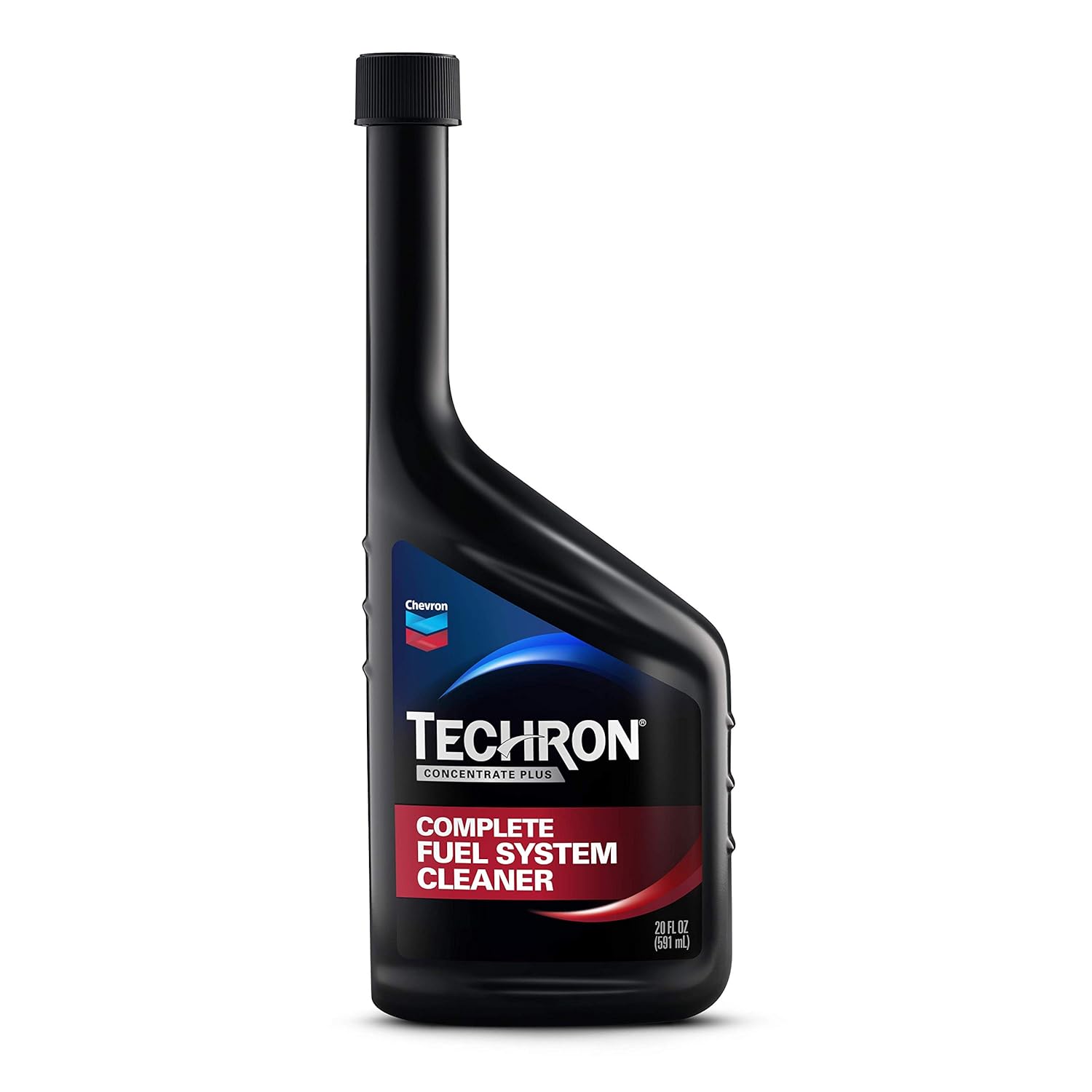
Chevron Techron Concentrate Plus Fuel System Cleaner is meant to work as a complete fuel system cleaner. That means it cleans, restores, and protects the entire fuel system; your fuel injectors, your fuel lines, even carburetors and sulfur-contaminated fuel gauge sensors. Through its unique formulation, it can restore lost power and performance and maximize fuel economy. It can also help with cold-start problems caused by fuel system buildup and minimize knock and ping caused by engine buildups.
This is one of the best complete fuel system cleaners on the market, removing fuel deposits and buildups from your fuel tank to your combustion chamber. It also comes with a long fill neck to make sure it is easy to pour into your tank as needed. One common issue reported, though, is that the cap and foil seal are sometimes not sufficiently sealed, meaning the contents can leak during shipping.
Best Value
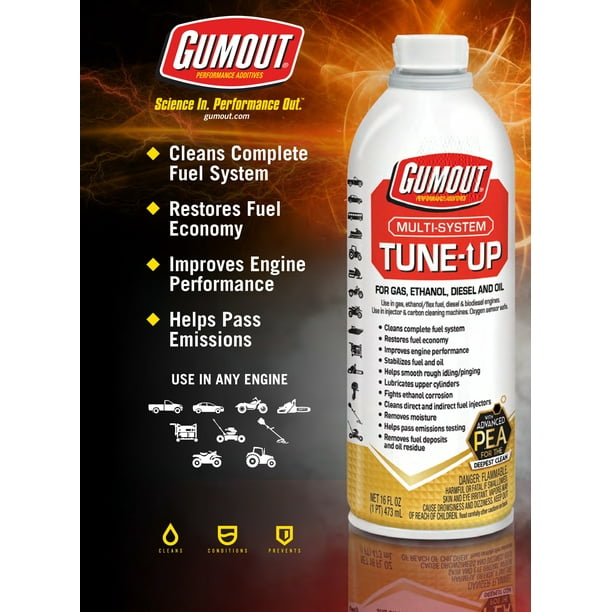
Gumout's Multi-System Cleaner goes above and beyond. It will clean your complete fuel system, including fuel injectors, lines, and the fuel pump thanks to its special blends of solvents. It will also help clean out carbon deposits from your intake valves and combustion chamber, though that's common to many of these cleaners. Where Gumout excels is that it can also be added to your engine oil and run for five to 10 minutes before your oil change to help clean deposits in your oiling system and it can be attached to your intake manifold to clean your vacuum system as well.
This one treatment can clean nearly every component of your engine, and the 16oz size means that you can treat a tank of gas, your oil, and your vacuum system, all with one bottle. That makes it a tough bargain to beat.
Honorable Mention

As a concentrated fuel system cleaner, this Red Line SI-1 is powerful stuff. It cleans to nearly 100 percent efficiency in a single treatment, barring any major carbon build ups. The formulation can help reduce pinging and lower your octane requirements if your engine needs higher octane because of carbon deposits. The system cleaner is safe for continual use, making it perfect for regular car maintenance. One small bottle per tank of gas is an effective treatment for cleaning out gunk and grime from your vehicle's fuel system.
Another great benefit of this product is the synthetic lubricant in the formulation, which coats the upper cylinders. This helps your engine run more smoothly. As part of a regular maintenance program, this product helps keep your intake manifold and throttle body free of carbon build-up, reducing wear on the engine's parts. If you've got an older car that has a ping caused by carbon build-up, this can help with that too.
Overall, this is a great product that delivers consistent results. However, while this is a fuel system cleaner that is safe for use with every tank of gasoline, the high price makes it unlikely that you'll want to use it more than once every few tanks.
Honorable Mention

Slick 50 designs this fuel system cleaner for vehicles with more than 75,000 miles. A vehicle with that many miles has seen loads of tanks of fuel, and plenty of dirt, dust, water, and temperature fluctuations. Those are what cause the deposits that slowly build up and rob your vehicle of power, performance, and fuel efficiency.
Click 50 High Mileage Fuel System Treatment helps to clean those harmful deposits from your fuel system with a strong blend of cleaners and solvents. It even contains ingredients to help stop them from building up again for up to 5,000 miles after the first bottle. Reviews report this product clearing up engine knocking and improved fuel economy on older models.
Honorable Mention
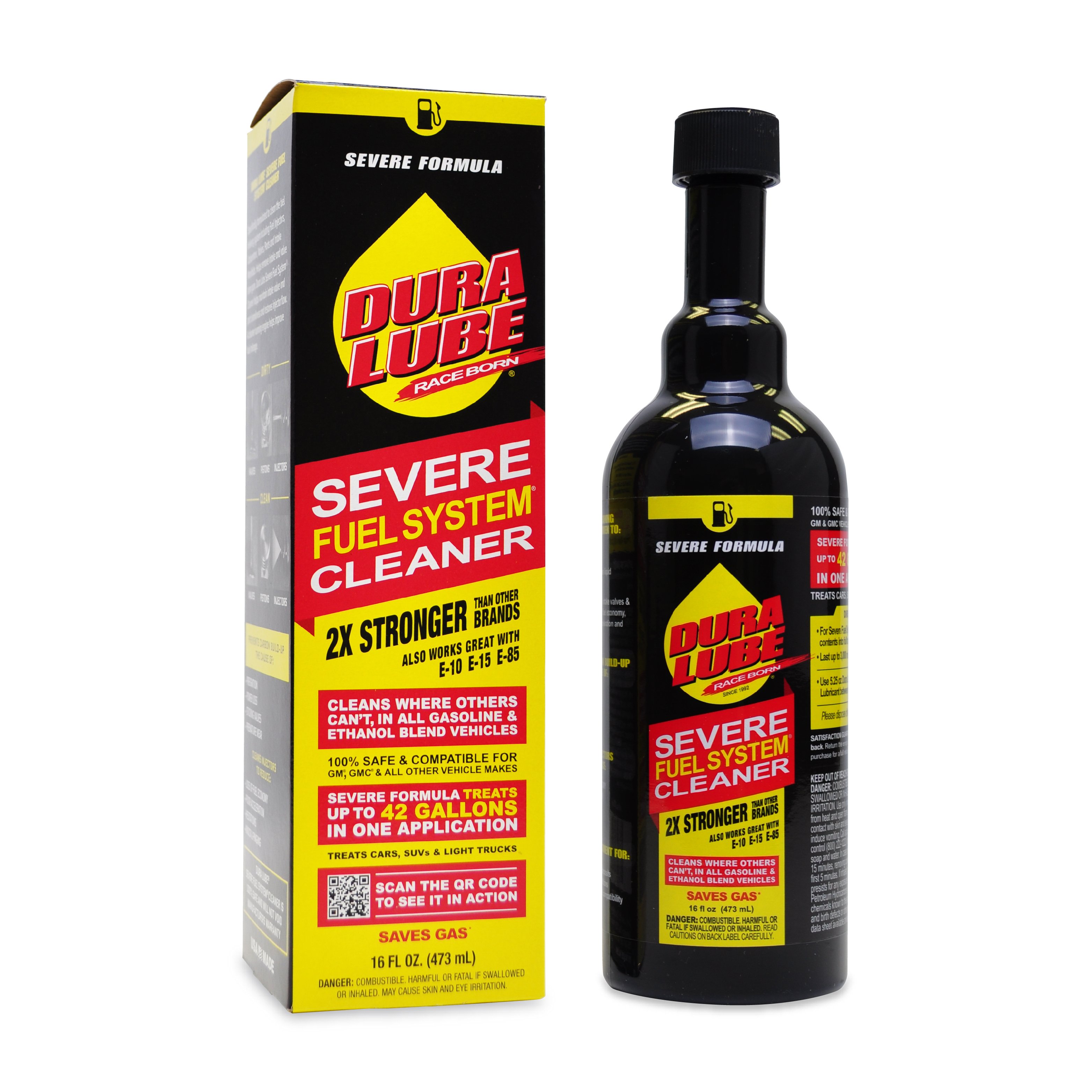
This ultra-concentrated bottle is able to treat up to 14 gallons of gasoline and ethanol-blend fuels up to E-85. The Severe Fuel System cleaner is designed to restore fuel injector flow, add corrosion protection to your entire fuel system, and to even help remove deposits on valve stems in your cylinder head.
Gasoline containing ethanol is known to capture more moisture, holding that water in the fuel mix and sending it through your fuel system, where it can cause damage and a poorly performing vehicle. Dura Lube's fuel system cleaner is meant to react to that water, actually stabilizing poor quality fuels and ensuring that the water does not cause problems in your fuel system. Users of this cleaner reported that they had tried other cleaners that didn't work, but Dura Lube did.
Honorable Mention
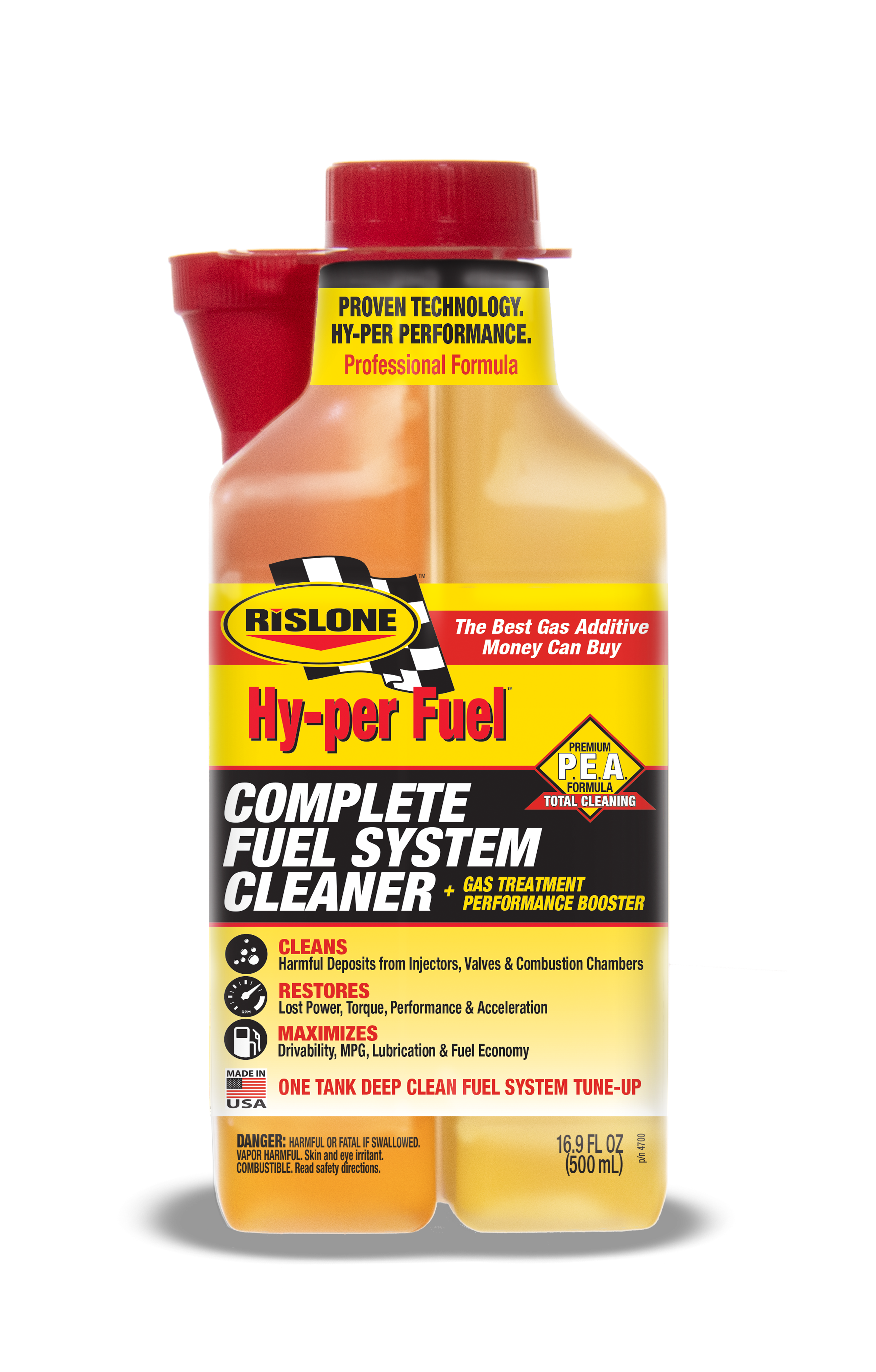
Hy-Per works to improve the quality of low-quality gasoline. It does that by adding more detergents as well as removing contaminants from the fuel. It also helps to prevent gasoline from going bad with storage, but that's just a side bonus.
It contains six different additives and has won industry innovation awards for its ability to clean injectors and fuel lines, and to lubricate fuel pumps. It can help quiet a noisy fuel pump as well as loud injectors. Rislone says it has dyno-proven fuel economy improvements and that regular use helps reduce fuel system repairs. It is registered with the EPA and exceeds that agency's compliance criteria.
Honorable Mention
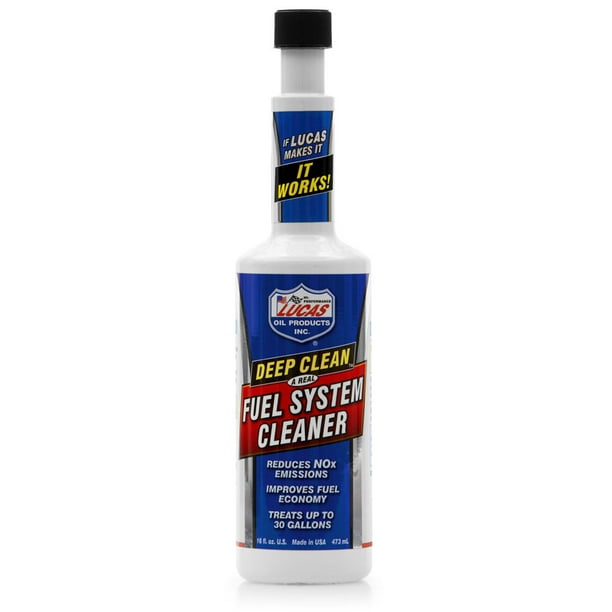
Lucas Deep Clean is designed to do what it says on the bottle. It uses a Lucas-exclusive additive package and a carrier fluid that is designed not to be harmless or useless to your engine. It removes carbon deposits from your fuel system and injectors and that means improved fuel economy and improved performance. Lucas Deep Clean contains 30-50 percent solvents and 10-30 percent PEA, both meant to thoroughly break-down and clean stubborn deposits while lubricating your fuel system.
This 12-ounce bottle is enough to treat up to 30 gallons of fuel, and is meant to be used every 3,000 to 4,000 miles, but can be used with every tank if that's what you're looking for.
Tips
- Follow the instructions on the cleaner bottle. Too much isn't necessarily better than too little, as it can actually cause more issues than your cleaner is trying to solve.
- This isn't going to work instantly, no matter what the bottle says. At the very least, there is already half a gallon of gas already in your pump and lines, and that needs to be burned before the cleaners can even start to work.
- High-mileage and very neglected vehicles may take more than one bottle of cleaner, and may not be able to be fully brought back to like-new. These are some impressive blends of chemicals, but they aren't capable of instantly reversing years of neglect. A broken fuel pump is still a broken fuel pump.
- Regular maintenance is important. Don't wait for a problem and then hope for a cleaner to fix everything. It might work, but using a fuel system cleaner more regularly, like once per oil change, can stop the slow build-up of contaminants in your fuel system from happening in the first place.
- Don't double up. Pouring two or more different bottles of fuel system cleaner into one tank of gas isn't going to work faster or more efficiently. If you're planning to use a second, different product, run your tank as low as possible, then run a clean tank of fuel through before adding the second cleaner.

gettyimages
Help prevent a costly catalytic converter replacement by keeping your fuel system clean and well-maintained
FAQs
Q: Do fuel system cleaners work?
If you get a quality fuel system cleaner from a reputable company, then yes. A complete fuel system cleaner can help remove stubborn deposits and contamination that are making your vehicle perform at less than its best. If you've been burning 10 year-old gasoline and have injectors filled with more sand and varnish than gasoline, maybe not, but your average older vehicle will see at least some improvement.
Q: Can a clogged fuel system be cleaned?
Yes, you really can remove deposits from sulfur, corrosion, and carbon that have built up in your fuel system over time. More stubborn deposits, especially those that are causing a check engine light, will probably need a more thorough cleaning, possibly needing some components removed.
Q: How much is a complete fuel system cleaner?
Some of the best fuel system cleaners are available for less than $5 if you're planning to use them with every tank of gas. While occasional use (with every oil change, for example) cleaners are more expensive, they should still come in at under $20.
Q: How do I use a complete fuel system cleaner?
Put simply, you follow the directions on the bottle. Normally the bottle will tell you to pour it in an empty (or near-empty) fuel tank just before you fill the tank with gas. This is to make sure it's as mixed in as possible. The bottle should tell you the maximum amount of gas the cleaner can treat. Going under that figure is usually fine, going over will have poorer results than following the label.
Q: How does a fuel system cleaner work?
A fuel system cleaner works in one or both of two ways. Either a detergent is added that encapsulates deposits like carbon in your fuel system and allows them to be washed out, like soap on your dishes, or a solvent is used that breaks down contaminants until they leave the system in tiny bits.
Final Thoughts
We've looked at fuel system cleaners from around the market and settled on Chevron Techron Concentrate Plus Fuel System Cleaner as the winner. Full of proprietary and patented solvents and cleaners, it can be used a few times a year, but it's also priced right if you want to use it with every tank. Looking for a one-stop-shopping solution? Gumout Multi System Treatment can be used in your fuel, your intake, and your oil, making it a great value.
MORE TO READ
-
Best Rust Converters & Removers: Options for Corrosion Protection
Keep your vehicle corrosion-free with these top rust converters and removers.
READ NOW
-
Best Engine Degreasers: Best Cleaners to Keep Your Engine Sparkling
Learn about the best degreasers to remove contaminants from your engine.
READ NOW
-
Hands-On Review: Best Oil Filters to Keep Your Engine Clean and Healthy
Take a look inside and compare new vs. used spin-on oil filters.
READ NOW
-
Best Motor Oil: Ensure Smooth and Reliable Performance
Oil is one of the most important fluids your vehicle's engine needs. Keep it running smoothly and reliably with one of these top-shelf options.
READ NOW
-
Best Oil Additives: Revive Your Vehicle's Engine Performance
Make your old car engine run like it's brand new with oil additives.
READ NOW
How To Use Catalytic Converter Cleaner
Source: https://www.thedrive.com/reviews/27986/best-catalytic-converter-cleaner
Posted by: tackittmaddeauttle.blogspot.com

0 Response to "How To Use Catalytic Converter Cleaner"
Post a Comment